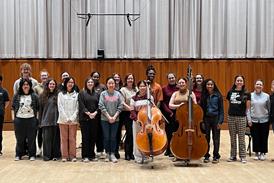- News
- For Subscribers
- Student Hub
- Playing Hub
- Directory
- Lutherie
- Magazine
- Magazine archive
- Whether you're a player, maker, teacher or enthusiast, you'll find ideas and inspiration from leading artists, teachers and luthiers in our archive which features every issue published since January 2010 - available exclusively to subscribers. View the archive.
- Jobs
- Shop
- Podcast
- Contact us
- Subscribe
- School Subscription
- Competitions
- Reviews
- Debate
- Artists
- Accessories
Abel Selaocoe: Uniting voice

South African cellist-singer-composer Abel Selaocoe’s genre-defying performances have earned him several recent awards and a recording contract with Warner Classics. Tom Stewart meets the Manchester-based musician following his powerful BBC Proms 2021 debut
What first fills the air of London’s vast Royal Albert Hall is the burnished sound of Abel Selaocoe’s voice, not his cello. Selaocoe, who was born in South Africa, opens this packed-out performance at the BBC Proms with a long, sighing phrase in Zulu: just a few pitches that begin high in his voice before descending into its deepest reaches. Here we meet another of his many talents – mastery of umngqokolo overtone singing, Selaocoe manipulating his throat to add a second pitch above the first so that his words acquire an ember-like glow. A third layer arrives with the cello, obscured at first low down in a sonic landscape populated by the BBC National Orchestra of Wales, chamber choir Bantu Voices and Chesaba, a trio Selaocoe formed in 2016 with British bass guitarist Alan Keary and Ivorian percussionist Sidiki Dembele. But before long, Selaocoe has raced to the top of his fingerboard, combining vocal gymnastics with technical and expressive virtuosity on the cello as if it were the most natural thing in the world, not a near-superhuman feat of coordination and control.
‘I wrote this for my nephew,’ Selaocoe says, introducing the first piece, Qhawe (‘Hero’, with the ‘q’ pronounced as a click). ‘Children have a whole lot of imagination we just don’t have. It’s a beautiful world to live in.’ There’s nothing childlike about Selaocoe’s skill or irresistible charisma, but over the next two hours, with surprises at every turn, he draws the audience into a world not many of us could have imagined. Most of the evening’s music has been written by Selaocoe himself, though the sounds of other African cultures also feature. From the continent’s northernmost tip, for example, a guest appearance by the cymbals, castanets and guembri – a type of Moroccan lute – performed by the Gnawa London collective, founded by Moroccan musician Simo Lagnawi, entrances not only the audience but also the other players with the swirling sounds of Sufi Islam…
Already subscribed? Please sign in
Subscribe to continue reading…
We’re delighted that you are enjoying our website. For a limited period, you can try an online subscription to The Strad completely free of charge.
* Issues and supplements are available as both print and digital editions. Online subscribers will only receive access to the digital versions.




























